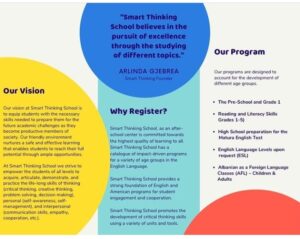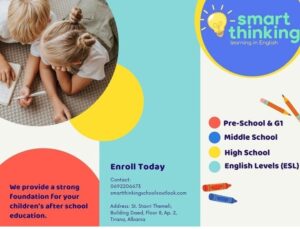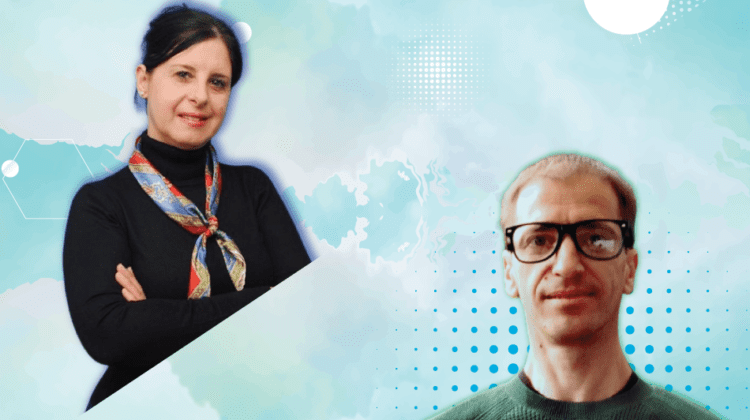

The importance of learning the critical thinking skill
The recent proliferation of Internet-enabled technology has significantly changed the way adolescents encounter and consume information, including explicit material!
Once confined to a personal computer the Internet is now available on laptops, mobile phones, video game consoles, and other electronic devices.With the growth of the Internet everything became easier to access, especially the ubiquitous access to social media apps. The purpose of this article was to review the recent event and literature regarding the impact of learning capacities and the role of the Internet. Specifically, we review the latest findings from the Program for International Student Assessment (PISA) and examined the impact of applied methodology in Kosovo and Albania.
The world we live today is all but digitized, and the way we consume online information, (verified and unverified) that we almost always take for granted through social networks, is disturbing to say the least.
Chart on digital media trends, by YouGov 2021
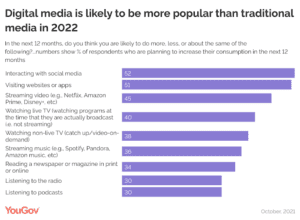

YouGov research on emerging digital trends
Global digitization has, undoubtedly contributed to educational and social improvement, (UN report 2020) through applications that can be simply accessed by whoever has an internet connection, and as a result the geographical gap we once had, has simply disappeared, and now inter-communication, payments and various online services prompted global trade to overcome many barriers we’ve faced not so long ago, hence, we’re witnessing a rapid socio-economic development in the last decade or so ( IMF 2021)
But on the other side of the spectrum, the uncontrolled access to social networks, the disturbing content and explicit materials, has been the price that we had to pay, and the most vulnerable part are always the teenagers, as many psychologist argue that, uncontrolled online exposure affects their cognitive development, while the scientists are researching the consequences of the emerging trends, such as: Tiktok and Instagram.
The education pillar, or the methodology on how we educate our kids remains the same, even though our society has experienced changes, not only in the way we learn, but also in the way we treat, analyze that what we learn, as a consequence, the students’ approach towards learning (with all the modern equipment at hands) has stalled, and entire educational system needs a serious reflection.
When I talk about stagnation of the educational system, I primarily refer to the findings of PISA (2018). Secondly, I also refer to the local teaching methodology, which has remained on the margins of ‘hearsay’ lectures and didactic discourse.
So, what were the ‘Pisa’ findings?
The ones that we least expected, or better say, we all had a hunch but kept silent about the painful reality; and intuitively blamed the usual suspect the so called ‘post-communist transition’ which is an ongoing process since forever!
The conclusions that students from Albania, and especially from Kosovo, have difficulties in reading, and essentially do not understand to what they read, is alarming for us all.
However, we are yet to internalize that the ‘old way’ simply isn’t working, memorized or didactic lessons, poor writing skills are among the key points that distinguishes us from developed countries, that already master an advanced levels of proper education through applications of group discussions, questions on the topic, reading and written comprehension, all of which are identified as priorities, as well as encouraging students, to start thinking about what do they read, and then write clearly and reach conclusions on the subject that is discussed
But what exactly is critical thinking and how to write a well-structured essay?
Critical thinking, according to the American researcher E. Glaser, is a combination of analysis, logic, communication and the formation of a critical opinion, through which we will be able not only to solve the problems we face, but also to come up with new and creative ideas, through active participation in the topic, and not being indifferent or observant to what is being said in the classroom
Through readings, students develop the ability to communicate, analyze, evaluate, explain and ultimately direct their thinking from a field that often comes with pre-existing assumptions, or conjectures.
During lectures, I always ask my students: “How do you know this?” and “How did you come to this conclusion?” through these questions, my main aim is to develop an assessment of the logical explanations of the formation of critical thinking.
That is, not to simply learn by heart, but how to organize reading into concepts, principles and theories, yet we try to take into account the environmental context and the students’ previous exposure to the applied approach.
According to the latest statistics from prestigious international colleges, such as Harvard and Oxford, where, among others, it is said that the most successful students are those students who possess high levels of critical thinking and advanced writing skills
Furthermore, according to a study by the Association of American Colleges and Universities, about 90% of employers view critical thinking as “very important” for hiring on senior position, or the decision-makers in the organizational hierarchy.
Chart from the Association of American Colleges and Universities
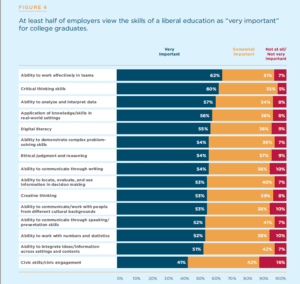

AACU’S research on importance of Critical thinking skills
Undoubtedly, our society needs diligent thinkers and above all, skilled critics, who will be able to debate on any social, national or international topics from studied and multifaceted points of view, through citing verified sources of information and conveying further knowledge and value to readers, listeners or viewers.
The time has come for us to focus more and direct our attention to the next generation, to those who will represent us tomorrow in the international arena, and for whom we will feel indeed proud.
But, to get there, we still have a lot of work to do, thus let’s focus our attention and energies towards reading, understanding, and critical analyzing, rather than promoting another ‘hearsay’ generation
Arlinda Gjebrea- is a linguist and teacher, founder of the ‘Smart Thinking’ academy in Tirana.
Arsim Ajeti – is a consultant and lecturer.
*for more on Critical thinking skills and ‘Smart Thinking’ academy click here;

